Punk rock emerged in the mid-1970s as a response to mainstream music’s excesses, characterized by its rebellious spirit and DIY ethos. This article explores punk rock’s origins, its cultural influence, and the key bands that shaped the genre, including The Ramones and Sex Pistols. It also examines the evolution of punk sub-genres, the impact on fashion and lifestyle, and the challenges faced by contemporary punk artists.
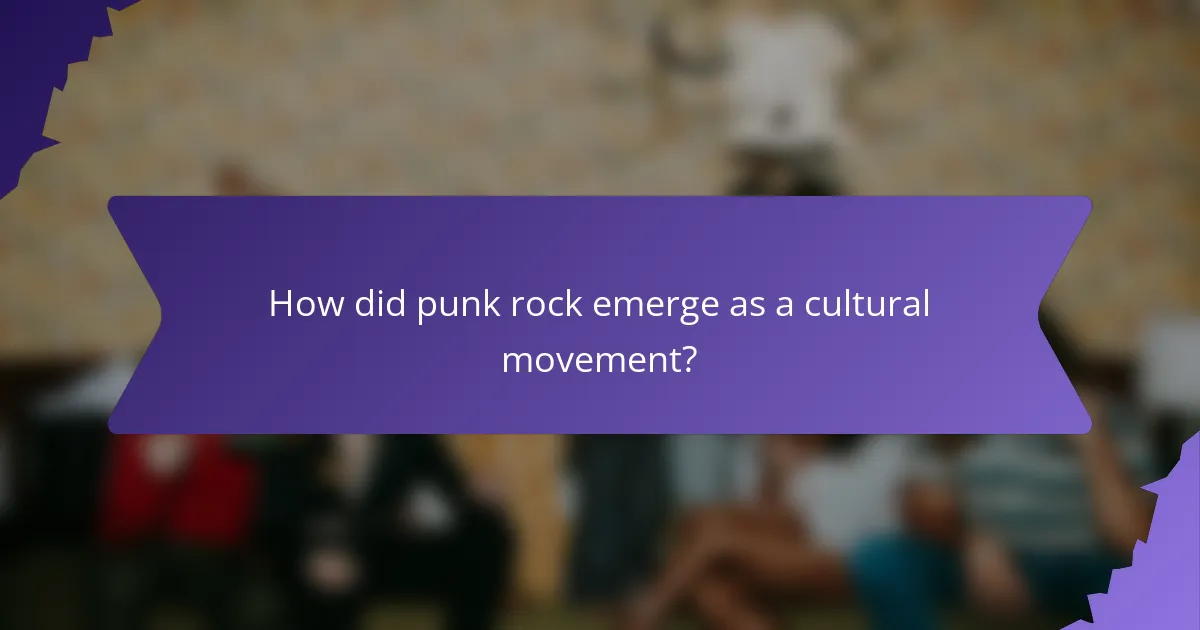
How did punk rock emerge as a cultural movement?
Punk rock emerged as a cultural movement in the mid-1970s, characterized by its rebellious spirit and DIY ethos. It arose as a response to the perceived excesses of mainstream rock music, emphasizing simplicity and raw energy. Key bands like the Ramones and Sex Pistols played pivotal roles in shaping the genre’s identity, promoting anti-establishment themes and a distinctive fashion style. The movement also influenced various cultural aspects, including art, fashion, and social attitudes, fostering a sense of community among its followers.
What social and political factors influenced the birth of punk rock?
Social and political factors such as economic turmoil, anti-establishment sentiments, and the rise of youth culture influenced the birth of punk rock. The 1970s saw disillusionment with mainstream music and societal norms. Economic struggles in the UK led to a sense of frustration among youth. Punk rock emerged as a rebellious response to these conditions, promoting DIY ethics and individuality. Key bands like the Sex Pistols and The Clash embodied this spirit, challenging authority and advocating for change through their music and lyrics.
Which cities were pivotal in shaping the punk rock scene?
London, New York City, and Los Angeles were pivotal in shaping the punk rock scene. Each city contributed unique cultural elements that influenced the genre’s development.
London was the birthplace of punk in the mid-1970s, marked by bands like the Sex Pistols and The Clash, who embodied rebellion against the establishment. New York City followed closely, with bands such as the Ramones and Blondie blending punk with other genres, creating a dynamic music scene. Los Angeles emerged later, with groups like X and the Dead Kennedys adding their local flavor, emphasizing socio-political themes and diverse musical styles.
These cities collectively fostered a vibrant punk culture, each contributing distinct sounds and ideologies that shaped the genre’s evolution.
What role did early punk bands play in defining the genre?
Early punk bands were crucial in shaping the genre by establishing its raw sound and anti-establishment ethos. Bands like The Ramones, Sex Pistols, and The Clash brought a sense of urgency and rebellion, influencing countless musicians. Their DIY approach emphasized independence from mainstream music, fostering a culture of self-expression. The unique attributes of these bands, including their distinctive fashion and lyrical themes, helped define punk’s identity. As a result, they laid the groundwork for future punk movements and subgenres, making them pivotal in music history.
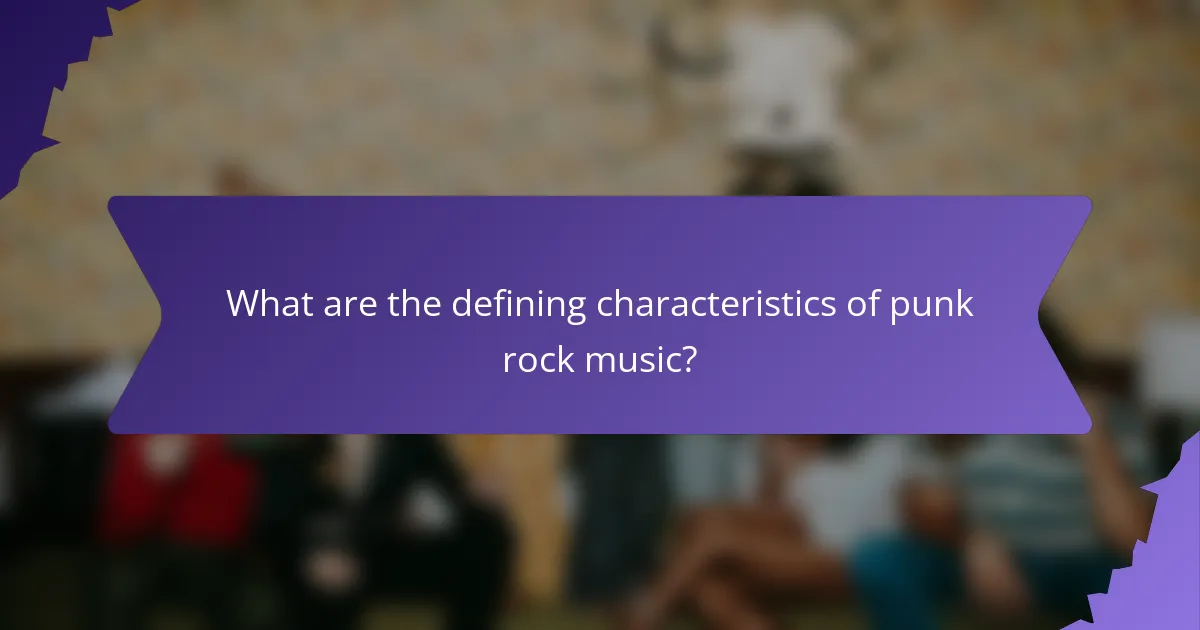
What are the defining characteristics of punk rock music?
Punk rock music is defined by its raw sound, rebellious attitude, and DIY ethos. Originating in the mid-1970s, it emphasizes fast tempos, simple chords, and anti-establishment lyrics. Key bands like The Ramones, Sex Pistols, and The Clash shaped its cultural influence. The genre often reflects social and political issues, making it a voice for youth discontent. Unique attributes include its distinct fashion style, characterized by leather jackets and unconventional hairstyles.
How does punk rock differentiate itself from other music genres?
Punk rock differentiates itself from other music genres through its raw sound, rebellious attitude, and DIY ethos. Originating in the mid-1970s, punk rock emerged as a reaction against mainstream music and societal norms. Key attributes include fast tempos, simple chord progressions, and often politically charged lyrics. Unique to punk rock is its emphasis on authenticity and self-expression, setting it apart from more commercial genres. Influential bands like The Ramones, Sex Pistols, and The Clash shaped its cultural impact, promoting a sense of community and activism within the genre.
What common themes and messages are found in punk rock lyrics?
Punk rock lyrics commonly express themes of rebellion, anti-establishment sentiments, and social critique. They often convey messages of individuality, personal freedom, and dissatisfaction with societal norms. Key attributes include a focus on political issues, personal struggles, and a call for change. Unique to punk rock is its raw, unfiltered emotional expression. Rarely, some lyrics incorporate elements of humor or irony, highlighting contradictions within society.
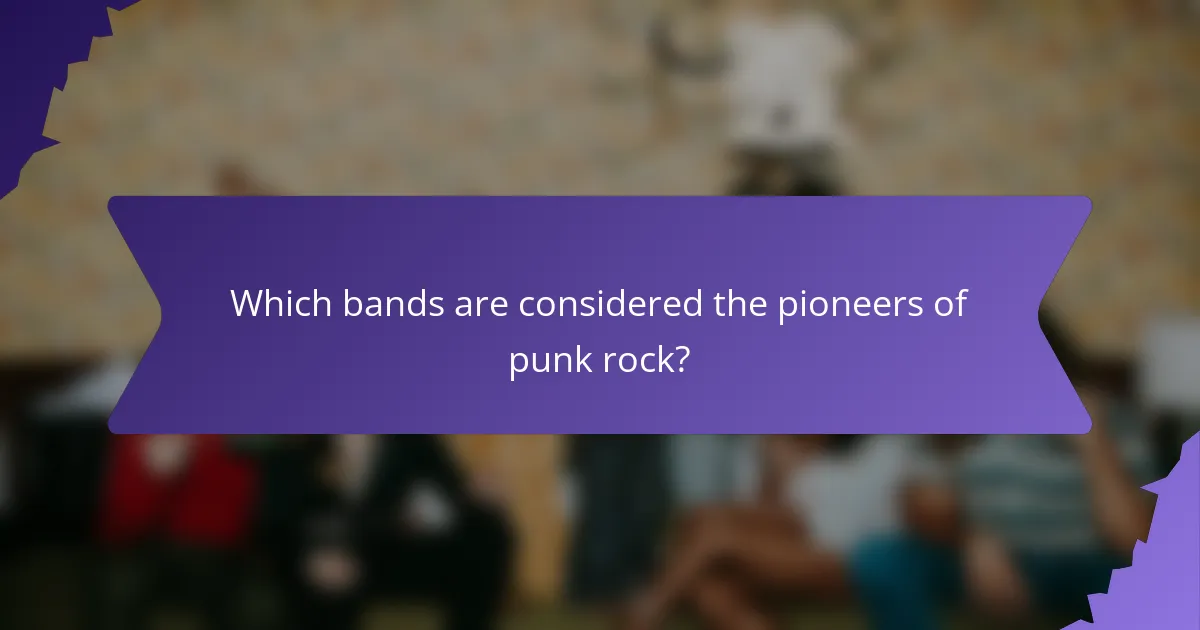
Which bands are considered the pioneers of punk rock?
The pioneers of punk rock include bands like the Ramones, Sex Pistols, The Clash, and Dead Kennedys. These groups shaped the genre with their distinctive sound and rebellious attitude.
The Ramones, known for their fast-paced songs, were instrumental in defining punk’s musical style. The Sex Pistols brought a raw, aggressive edge, influencing the punk ethos. The Clash incorporated diverse musical influences, while Dead Kennedys offered sharp political commentary.
Each band contributed unique attributes that helped establish punk rock as a cultural movement, resonating with youth discontent in the 1970s. Their legacy continues to inspire new generations of musicians.
What impact did The Ramones have on the punk rock genre?
The Ramones significantly shaped the punk rock genre through their raw sound and rebellious attitude. Their fast-paced songs and minimalist style set a template for future punk bands. The band’s self-titled debut album, released in 1976, introduced a new musical ethos that emphasized simplicity and energy. This contrasted sharply with the prevailing rock music of the time, which often featured elaborate production.
The Ramones’ influence extended beyond music; they became cultural icons representing youth angst and anti-establishment sentiments. Their fashion choices, including leather jackets and ripped jeans, became synonymous with punk culture. As a result, they inspired countless bands and movements worldwide, establishing punk rock as a distinct genre.
Moreover, the Ramones’ commitment to DIY ethics encouraged aspiring musicians to create and perform without the constraints of mainstream music industry standards. This unique attribute of fostering independence and creativity is a cornerstone of punk rock’s enduring legacy.
How did Sex Pistols influence the global punk movement?
The Sex Pistols significantly shaped the global punk movement through their rebellious ethos and raw sound. Their 1977 album “Never Mind the Bollocks” became a manifesto for punk culture, promoting anti-establishment sentiments. This influence spread globally, inspiring bands in various countries to adopt similar styles and attitudes. The band’s provocative image and controversial performances challenged societal norms, encouraging a DIY approach in music and fashion. Their impact is evident in the emergence of punk scenes worldwide, from the U.S. to Japan, fostering a sense of community among like-minded individuals.
What contributions did The Clash make to punk rock and beyond?
The Clash significantly shaped punk rock through their innovative sound and political lyrics. They blended various genres, influencing future music styles and artists. Their self-titled debut album introduced a raw, energetic style that defined punk. The song “London Calling” showcased their unique ability to address social issues, merging punk with reggae and rockabilly. Their commitment to activism and cultural commentary set a precedent for punk’s evolution beyond music into a broader cultural movement.

How has punk rock influenced fashion and lifestyle?
Punk rock has significantly influenced fashion and lifestyle by promoting individuality and rebellion. The punk aesthetic features leather jackets, ripped jeans, and bold hairstyles. This style challenges mainstream norms and encourages self-expression. Key bands like The Sex Pistols and The Ramones popularized this look, inspiring generations. The punk ethos extends beyond clothing, impacting attitudes toward authority and societal expectations.
What are the key fashion trends associated with punk rock culture?
Punk rock culture is characterized by distinctive fashion trends that emphasize individuality and rebellion. Key trends include leather jackets, band t-shirts, ripped jeans, and combat boots. Accessories like studs, spikes, and chains are also prevalent, reflecting a DIY ethos. The punk aesthetic often incorporates bold hairstyles, such as brightly colored spikes or mohawks, symbolizing defiance against mainstream norms.
How did punk rock challenge societal norms and values?
Punk rock challenged societal norms and values by promoting anti-establishment attitudes and individualism. It rejected mainstream culture and commercialism, advocating for authenticity and self-expression. Key bands like The Sex Pistols and The Ramones used provocative lyrics and a raw sound to confront political and social issues. This genre fostered a sense of community among those disillusioned by societal expectations, influencing fashion, art, and youth culture. The DIY ethic of punk encouraged creative freedom and empowered marginalized voices, reshaping cultural landscapes.
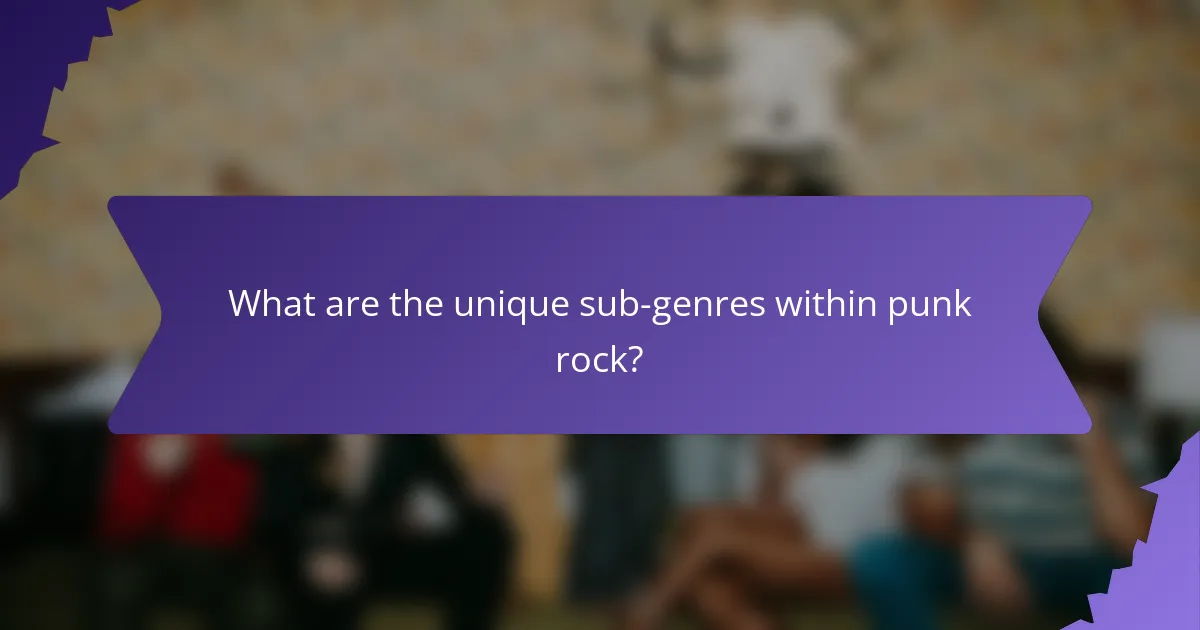
What are the unique sub-genres within punk rock?
Punk rock features several unique sub-genres, each with distinct characteristics. Notable sub-genres include hardcore punk, which emphasizes speed and aggression; pop punk, known for its catchy melodies; and post-punk, which incorporates experimental elements. Other sub-genres are ska punk, blending punk with ska rhythms, and emo, focusing on emotional expression. Each sub-genre reflects different cultural influences and musical styles within the broader punk rock movement.
How does pop-punk differ from traditional punk rock?
Pop-punk incorporates melodic elements and themes of youth culture, while traditional punk rock emphasizes raw energy and social rebellion. Pop-punk often features catchy hooks and polished production, appealing to a broader audience. Traditional punk rock, rooted in the 1970s, focuses on straightforward instrumentation and anti-establishment lyrics. Key bands like Green Day represent pop-punk, while The Ramones exemplify traditional punk rock. This evolution highlights how pop-punk has adapted punk’s ethos for mainstream appeal.
What defines hardcore punk and its significance in the scene?
Hardcore punk is defined by its aggressive sound, fast tempos, and raw energy. It emerged in the late 1970s as a reaction to mainstream punk, emphasizing DIY ethics and social activism. Bands like Minor Threat and Black Flag played pivotal roles, shaping the genre’s identity. Hardcore punk’s significance lies in its influence on cultural movements, promoting individualism and resistance against societal norms. Its legacy continues to inspire new generations of musicians and fans, reinforcing the genre’s enduring impact on the music scene.
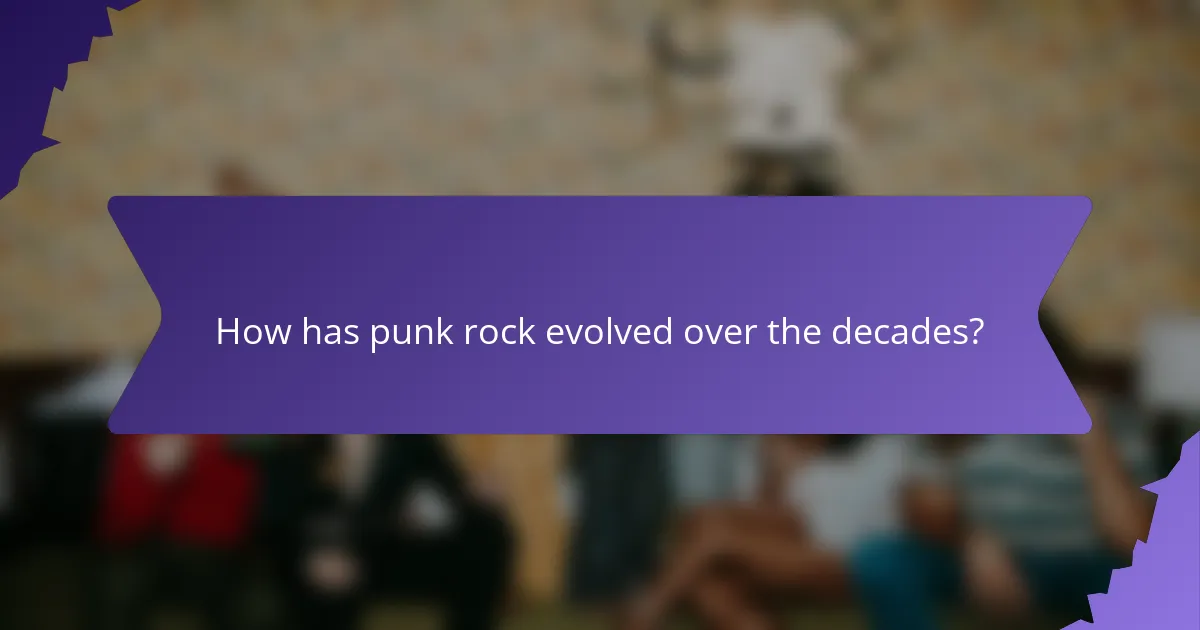
How has punk rock evolved over the decades?
Punk rock has evolved significantly since its emergence in the 1970s, adapting to cultural shifts while maintaining its rebellious spirit. Initially characterized by raw sound and anti-establishment lyrics, punk rock diversified into subgenres like hardcore and pop-punk. Key bands such as The Ramones, Sex Pistols, and Green Day shaped its trajectory, influencing fashion and youth culture. The genre has also embraced political themes, addressing issues from social justice to environmentalism, reflecting the changing concerns of its audience. Today, punk rock continues to inspire new artists and movements, showcasing its enduring relevance in contemporary music.
What significant changes occurred in punk rock during the 1990s?
Punk rock experienced significant changes in the 1990s, shifting towards mainstream acceptance and diversification. Bands like Green Day and The Offspring popularized pop-punk, while others like Rancid and No Doubt incorporated ska influences. This era also saw the emergence of alternative rock, blending punk’s energy with various genres. The DIY ethos remained influential, but commercialization altered the scene’s dynamics.
How is contemporary punk rock different from its origins?
Contemporary punk rock differs from its origins primarily in its musical diversity and cultural themes. Early punk rock emphasized raw sound and anti-establishment lyrics, while modern iterations incorporate various genres and address broader social issues.
Musically, contemporary punk often blends elements from pop, metal, and electronic music. This fusion creates a more polished sound, contrasting with the gritty, straightforward style of the 1970s.
Culturally, early punk was a reaction to political and social unrest, focusing on rebellion and individualism. In contrast, contemporary punk explores themes like identity, mental health, and inclusivity.
Key bands today, such as Paramore and Rise Against, exemplify this evolution by merging punk roots with diverse influences and addressing complex societal issues.
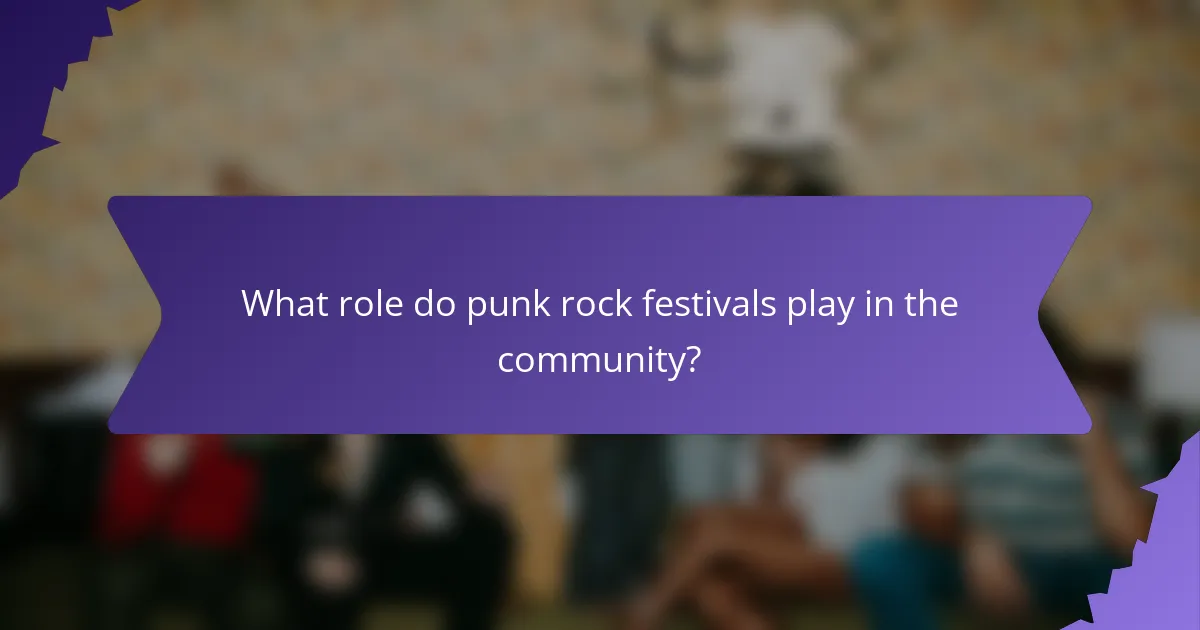
What role do punk rock festivals play in the community?
Punk rock festivals play a vital role in fostering community engagement and cultural expression. They provide a platform for local bands, promote collaboration, and create a sense of belonging among attendees. These events often support local economies by attracting visitors and boosting sales for nearby businesses. Additionally, punk rock festivals can address social issues, promoting activism and awareness through music and art. They serve as a space for diverse voices, celebrating individuality while uniting fans through shared values of rebellion and authenticity.
Which festivals are considered essential for punk rock fans?
Key festivals essential for punk rock fans include Punk Rock Bowling, Rebellion Festival, and Fest. These events celebrate punk culture, featuring iconic bands and fostering community. Punk Rock Bowling, held in Las Vegas, combines music with bowling tournaments. Rebellion Festival, in Blackpool, UK, showcases a diverse lineup of punk acts. Fest, located in Gainesville, Florida, is known for its intimate atmosphere and extensive punk roster. Each festival highlights the genre’s evolution and cultural significance.
How do festivals promote new and emerging punk bands?
Festivals significantly promote new and emerging punk bands by providing exposure and networking opportunities. These events attract diverse audiences, enabling bands to showcase their music to potential fans and industry professionals. Festivals often feature multiple stages, allowing various bands to perform simultaneously, which increases visibility.
Additionally, festivals create a collaborative environment where emerging bands can connect with established acts, fostering mentorship and collaboration. The communal atmosphere encourages fan engagement, as attendees often share their festival experiences online, amplifying exposure for the bands.
Moreover, many festivals prioritize local and underground talent, giving emerging punk bands a platform to reach wider audiences. This focus on grassroots music aligns with the punk ethos, promoting authenticity and innovation within the genre.
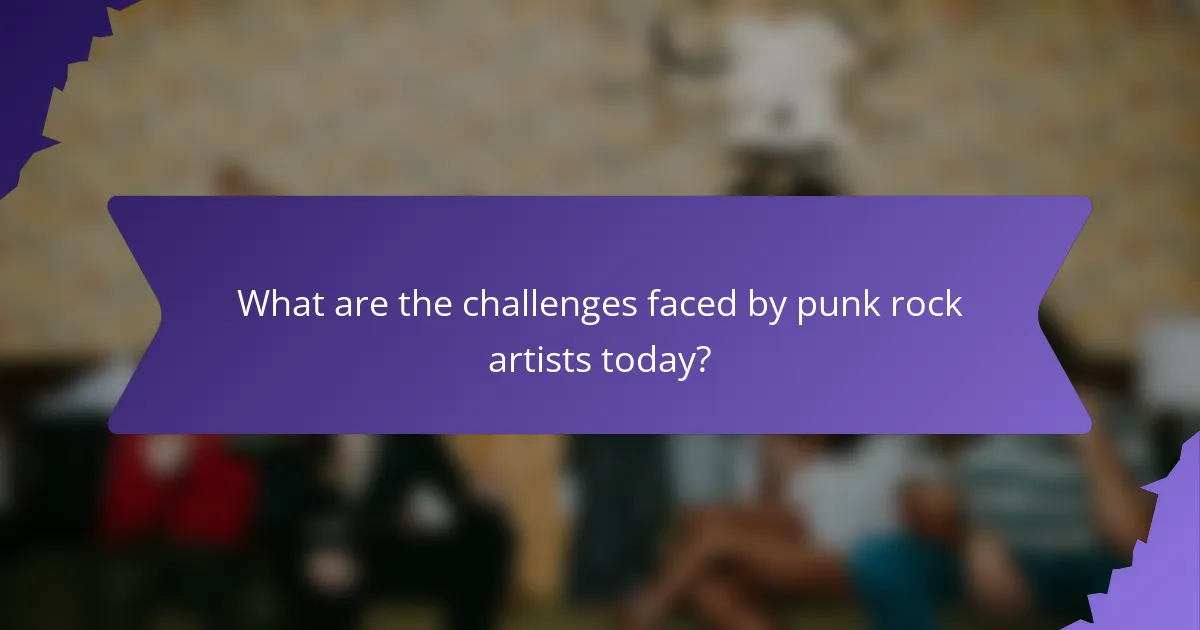
What are the challenges faced by punk rock artists today?
Punk rock artists today face challenges such as commercialization, maintaining authenticity, and navigating digital platforms. The genre struggles with mainstream acceptance, often leading to conflicts between artistic integrity and commercial success. Additionally, the rise of streaming services affects revenue and exposure for independent bands. The DIY ethos, once a hallmark of punk, is challenged by the need for online presence and marketing strategies. These factors create a complex landscape for artists aiming to stay true to their roots while adapting to modern industry demands.
How has the digital age impacted punk rock music distribution?
The digital age has revolutionized punk rock music distribution by enabling direct artist-to-fan connections. Online platforms allow bands to release music independently, bypassing traditional record labels. Streaming services have increased accessibility, allowing listeners worldwide to discover punk rock. Social media facilitates community engagement and promotes events, enhancing the genre’s cultural influence. As a result, punk rock has evolved into a more democratized and diverse music scene, reflecting its roots in rebellion and self-expression.
What common misconceptions exist about punk rock culture?
Punk rock culture is often misunderstood, leading to several common misconceptions. Many believe punk rock is solely about rebellion and chaos, overlooking its roots in social commentary and artistic expression. Another misconception is that punk music lacks musicality, while in reality, it encompasses a wide range of styles and influences. Some think punk is exclusively male-dominated, ignoring the significant contributions of female artists and bands. Additionally, the stereotype that all punk fans are aggressive fails to recognize the community’s diversity and its focus on inclusivity. Lastly, many assume that punk is a fleeting trend, but its enduring influence on music and culture proves otherwise.
What strategies can punk rock bands use to thrive in the current music landscape?
Punk rock bands can thrive by embracing digital platforms, engaging with fans, and diversifying revenue streams. They should utilize social media for promotion and community building, leveraging streaming services for wider reach. Collaborations with other genres can attract new audiences, while merchandise sales provide financial support. Live performances, both virtual and in-person, remain crucial for connection and income. Additionally, maintaining authenticity and staying true to punk values can strengthen their cultural influence and fan loyalty.